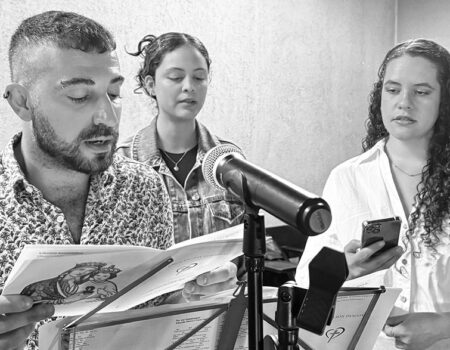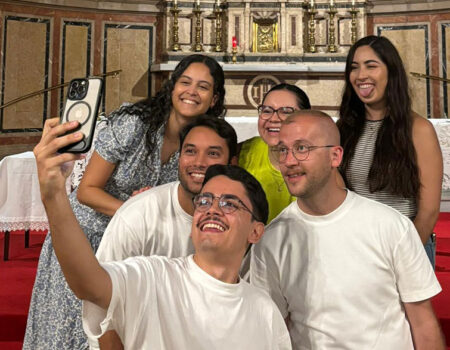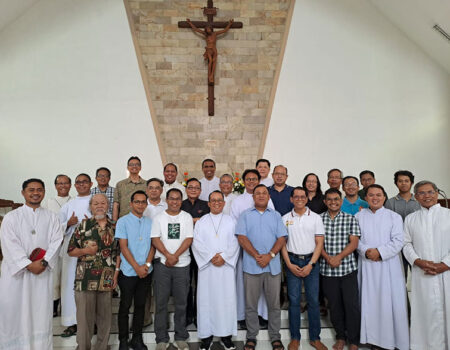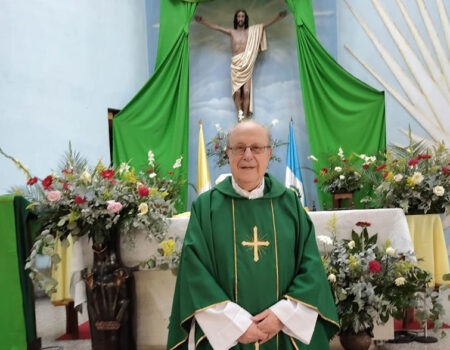THE MISSION TO ACCOMPANY
Initial Formation and Accompaniment
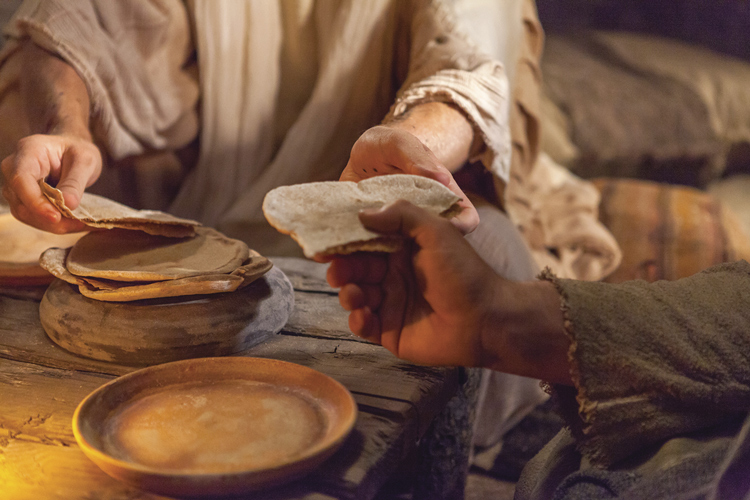
The road always gets shorter and the fatigue is always less when you have good travelling companions (Haved Nivah)
- Breaking bread together
The origin of the word “accompany” is rooted in the Latin word “companio”, from cum panis, that is, the one with whom bread is shared. The same Latin root also gives rise to the word companion and, in this case, why not say travelling companion. All the symbolic richness of this reference can help us to understand what the divine mission of vocational accompaniment means for us formators within the House of Formation.
Because we are relational beings, we do not break bread or share the road with only one person. Even more so when we speak from the ecclesial context and Religious Life, the bread is the food that is broken in community and the road is the same for all, even if it is travelled in an individual way. On this basis we can certainly affirm that the first subject of accompaniment is the community as a whole. A community, be it missionary or of a house of formation, is the main subject of accompaniment.
Eating the same bread together does not only refer to the act of sharing food, but, above all, to life and to the journey that is made by walking together. It will be very important here to highlight a passage contained in our Valladolid document, in which the former Father General, Kees Braun, msc, defines the House of Formation as “A Formative Community”[1]. I think there is an important paradigm shift here. When we speak of houses of formation or seminaries, we tend to think only of the physical place where formators and formandi are placed, some with the duty to “form” and others with the obligation to be “formed”. But when we speak of formative communities, we can understand that the actor of formation is not only one (the formator), but several, or better, it is the community itself which forms.
Even if we consider this background of the community that forms, it is clear for all of us the fundamental role that the formator exercises as an accompanier. It is a specific duty which flows from his mission within a house of formation (formative community). It is up to him to accompany both the community and the individual who has entered the formation process.
The community’s accompaniment aims at highlighting the limits and qualities of each person in his relationship with the other(s), as well as evaluating whether the members of the formative community are capable of evolving in humble service and in sharing the gifts received. A community will only be a true school of disciples if the members place themselves at the service and, through fraternal correction, denounce every possible trace of seeking power and annihilation of the other within the community. The accompaniment of the community is inserted in the context of discipleship and goes back to the community of the twelve who, before being sent on mission, were called to be with Him (cf. Mk 3:14). Those who do not succeed in being together in community will hardly be able to be missionaries in the name of the community.
Individual accompaniment, on the other hand, to which we will dedicate more attention in this text, aims at helping the one in formation to integrate progressively the various dimensions that characterise his life and personality in order to, living in community, embrace the congregational charism and serve the Lord. “In this process, three instances are articulated: listening to life, the encounter with Jesus and the mysterious dialogue between God’s freedom and that of the person. Who accompanies, welcomes with patience, raises the truest questions and recognises the signs of the Spirit in the young people’s response.”[2]
The young person who has decided to undergo the formation process is someone at a critical moment of life change. How each one works out this change will depend very much on who accompanies him and how he accompanies him. Regarding the ‘how’ – the strategy – we could here outline two, using the words of Pope Francis on formation[3]:
- The police way – the one in which the formator will use accompaniment and conversations to try to control the formandus so that he/she follows the rules and what he/she is told to do[4]. I could also call this modality superficial, since it sees what emerges, but fails to perceive what is submerged and at the source of the formandee’s actions.
- Artisanal modality – that in which the guide values the formator as he is and teaches him to discern from what he brings with him, taking into account his lights and shadows[5]. Here the formator may even be attentive to the rules which, by force, must be obeyed. But this will not be the focus of his attention. Rather, he should pay attention to the source, that is, to the place from which the formandi acts. Different from a superficial way of accompanying, this strategy is deeper and more coherent with the type of formation we want and with the Spirituality of the Heart.

- The individual accompaniment during the formative process
In the specific case of the young man in Initial Formation, I think that the objective of individual accompaniment is to detect the vocational signs present in the motivation of the young man who wants to give himself to Consecrated Religious Life. More than that, regular and progressive accompaniment aims at perceiving and identifying if the personal charism of the candidate – because each of us carries a personal charism – can accommodate within itself the charism of the Congregation – which also has its particularity. In other words we could say that accompaniment should discern whether the candidate has a vocation to live the charism left by the founder within the mission of our Religious Congregation.
The person of the formator (accompanier) appears in the Document of the Synod for Youth as the “unifier” of the formative journey and, in consultation with other actors involved in the formation process, he or she may decide to interrupt the formative journey of a candidate if, through accompaniment, he or she perceives a lack of vocational and/or religious bonds with Religious Life and with the Congregation.
If, on the one hand, we understand vocation as a call (from the Latin = vocare), on the other hand we have to say that not every candidate is called to a religious vocation and that often they enter the process with other motivations, conscious or not, more linked to the image of the Church as an institution than to the Church as a charism[6]. And for this reason accompaniment throughout the whole process is absolutely necessary in order to help the candidate, in freedom, to discern what his or her true vocation is.
It should also be noted that accompaniment presupposes an ethical task when we consider that the human being is a subject capable of making choices and that choosing his future is something that belongs to him and should not be expropriated by anyone. We cannot in any way ‘proselytise vocations’, that is, try to convert a person without a vocation to Religious Life only because of our low numbers or for other reasons.
I do not want to say here that the true vocation is one hundred per cent pure. We can be rescued by the Lord from any situation, even those linked to the socio-economic aspect, such as, for example, candidates who come to us because of the lack of prospects of life and employment. This is also the way the Lord can call. The question for accompaniment is not so much what motivated the entrance into the formation process, but what keeps him going, as well as having the minimum of certainty that the one being formed is capable of understanding that missionary life is service and not a way of gaining advantages or hiding from oneself.
Therefore, as the individual accompaniment evolves, the formator must know how to evaluate the need or not for psychological accompaniment. The final document of the Synod on Youth recognises that
“ Psychological or psychotherapeutic accompaniment, as long as it is open to transcendence, can prove fundamental for a journey of integration of the personality, and it can reopen to the possibility of vocational growth certain aspects of the personality that are closed or blocked. Young people live all the richness and fragility of being an “open book”. Psychological assistance could not only help them patiently to relive their personal history, but also to reopen questions so as to help them arrive at a more stable affective equilibrium.[7].
A si ne qua non condition for making any life choice is self-knowledge. The person needs to know who he is before making an important decision in life, such as a vocational one. He needs to define himself socially, religiously, ethically, he needs to define his sexual and occupational identity[8]. All this will be configured in his personal identity. When the formandi can minimally define himself, he will be able to make choices in life.
Having said this about individual accompaniment, let us make use of the three instances brought forward by the document of the Synod for Young People, mentioned above, and try to understand where these three instances are situated in the formation process. Accompaniment is a journey to be undertaken. Formator and formandee travel together along the same road.
- Listening to life, meeting Jesus and the mysterious dialogue between two freedoms
The episode of the disciples’ journey to Emmaus (Lk 24:13-35) is more than a reference point when we speak of travelling the same road together. It can be considered an archetype from which we can understand many aspects of life. Here I want to use this passage from the Gospel of Luke to speak of accompaniment from the process through which Jesus subjects the two disciples. In this case, Jesus is the formator (accompanier) of the two formands (disciples) who needed to give a new meaning to the pain they experienced.
- Listening to life – Jesus draws near and walks with them (Lk 24:13-15)
The disciples were sad on their way, searching for a meaning or a feeling that would express all their disappointment at the events that had just occurred. Many kinds of feelings are born in us and we cannot define what they are and why they are there. We become lost. At that moment Jesus came to walk with them and began to listen to them, without judgements, without corrections, without cynicism, with an open mind and heart, to simply welcome what the two brought from their life stories and the expression of their feelings.
Individual accompaniment, for whatever purpose, requires first of all an attitude of listening to life. By the term “listening to life” I mean all the stories stored in our minds, hearts and bodies. Yes, there are life stories marked on the body – postures, illnesses, marks, behaviours, etc. – and that we must also try to understand them. To listen to the life story of the person in formation is not to alienate oneself from the common behaviour of many spiritual companions who are content to listen to superficial formulations of a spiritual experience totally detached from reality. When one begins to speak too much of heaven and too little of the clay of which we are made, we must lead the person to look at his own humanity, at his own humus.
Listening to life will require a two-way movement: on the part of the one being accompanied, he/she must grow in confidence and be capable of unfolding his/her story gradually in the sense of seeking to see the whole and discern where God is leading him/her. On the part of the one accompanying, he will have to offer such confidence so that the one being formed feels secure in sharing his bread, his stories, and in travelling his way being helped by him.
Here, however, a big problem can arise for the one in formation, but it is possible to solve it with patience and wisdom: how to trust someone who is going to evaluate me on the basis of what I say? The formandi knows that he has to open up to the formator, but he also knows that he will be evaluated by his formator. One of the simplest ways to untie this knot is when it is clear to both of them that honesty and sincerity are the elements which weigh for such an evaluation.
Right at the beginning of the journey the formator has to say and show that openness and transparency are essential conditions for accompaniment and that this is what must be evaluated: to what extent is this candidate able to be honest with himself and with the Congregation in order to ‘finance’ his vocation? For me, if individual accompaniment must have a criterion, this is one of the most relevant. The formator must, however, be patient and know that trust is not built overnight. You can’t expect a formandi to reveal everything about himself in the first conversation. But neither can you accept that a formandi, at the end of the process, has revealed nothing about himself.
People, and in our case formandi, want to be listened to with empathy. They want to be welcomed, cared for and healed, just as the disciples felt welcomed by the Master when they went with him on the road sharing their lamentations. The Master put on their sandals, walked the road with them, let them express themselves. In listening, it is not a matter of bringing ready-made answers to all questions. Indeed, this is one of the great temptations we have as clerics, that is, to have to give answers to all questions. Accompanying has more to do with deepening the questions than with answering them.
The one who listens with empathy must be attentive to the cultural, economic, social and worldview differences that each formandus brings. Sometimes even young people from the same region bring completely different experiences, especially in today’s globalised world. It is no longer possible, in accompaniment, to have ready-made recipes and answers for everything. This is why, once again, accompaniment is not about solving problems, but about listening to the life that pulsates in each individual, empowering him little by little to be able to choose the path to follow.
Just like the disciples of Emmaus, those in formation today bring many disillusions: relationships with their parents and family, marginalization, exclusion, stories of abuse – whether of power or even sexual abuse – their bodies and affectivity, as well as many others that could be cited here. Many of these disappointments will be given new meaning through listening. Jesus follows the same path, listening to them.
- Encountering Jesus – The eyes of the disciples are opened (Lk 24:27-31)
Jesus enters the house of the disciples at their request: “It is late, stay with us”. And there, as he breaks the bread, their eyes are opened, they recognise Jesus and remember that their hearts burned as he explained the Scriptures to them on the way, showing that all those things had to happen for history to be fulfilled.
In individual accompaniment during the formation process, this second stage is perhaps the most demanding for the accompanier. Because it is a matter of reformulating the questions, of reviewing (seeing with other eyes) life through another perspective. The formator here will need to be able to open up the map of life before the eyes of the one being formed and show that there are unexplored areas, places where perhaps he has not been able to reach and indicate the way to go there and bring out what needs to be talked about and explored.
Just as Jesus patiently explained the Scriptures to the disciples of Emmaus, showing them that everything should happen that way, the formator should do the same: consider all that has happened or is happening in the life of the one being formed, so that he can understand the past from what he is asking to be born. The companion should help the one being accompanied to perceive the signs and to see his story starting from the resurrection and not from the traces of death present in it. Moreover, see it as the story of a call, if this is the case.
For accompaniment to evolve to this stage, the conversations must be deep and not superficial. It is necessary that the object of the conversations is something important to be re-signified (given another meaning). In accompaniment, there will be days when conversations are merely superficial or practical. And it is good that not all conversations are demanding. Sometimes it is important to relax and allow time for the most important themes to emerge. However, if the formator perceives that the formandi only brings up superficial issues, he will need at some point, to provoke him to go deeper into the issues and invite him into his ‘house’.
From experience, we know that each person who actually undergoes the process always has a point around which the conversations and questions revolve. Usually it is an event, a trauma, a distorted self-image that raises other and other questions. It is important here to find that point of convergence and, starting from it, to go on reading the events in the light of the resurrection and of the vocational call.
The formator will have to be well sustained by the living of a spirituality that allows him to lead the one in formation to that other stage, which is that of the encounter with Jesus. It is here that, starting from the hard reality of the history which the one in formation brings, with all its pains, the formator is called to ask himself together with the one in formation: ‘Why has this happened in my life? This question destroys the victimhood of the ‘why’, which points to the past, and builds the protagonism of the ‘why’, which throws us towards the future. The objective is to go, together with the formandee, identifying the vocational elements present in his history in the light of the Spirit of God, in order to discern what his vocation is. If nothing is by chance, we need companions who know how to listen and make the one accompanied encounter Jesus, that is, with the ‘why’ of his history.
- The mysterious dialogue between two freedoms – And they returned immediately to Jerusalem (Lk 24,33)
From listening to the Word we pass to the joy of the encounter with Jesus. He explains to them all that had to happen for the disciples to come to recognize that He was with them, that He had not deceived them and that He would continue with the disciples through the presence of the Holy Spirit. And the most important thing: that the sign of the breaking of the bread would become for them the sacrament of eternal life. The disciples no longer have any doubts and now know what to do: they set off back to Jerusalem to spread the Good News to others and to continue the mission left by the Lord.
Knowing what to do. Knowing what response to give. If individual accompaniment reaches this level, we can say that it has fulfilled its role. The formator who, at the end of the accompaniment – be it of one year, of one stage or of the whole formative process – has helped the one in formation to give an answer, in freedom, will have helped this candidate in his discernment.
By listening to life, the formator will help the one in formation to look from another perspective, to see things that cannot be seen superficially, to clarify what is blurred, to ask questions that the one in formation has not yet had the courage to ask himself. At the end of the journey, when things take on new meaning, the one in formation will be at peace with his story and will have the freedom to make choices, whether to continue on the path of Religious Life or not. Without all this movement, it is quite possible that the choice will be influenced by our disordered affections, by the mistaken reading of our life story or even by the image of an institutional Church fixed in power.
According to Rodolfo Boholavsky, a great specialist and theorist in professional orientation, every vocation is an attempt at reparation[9]. In a very summarised way, his idea is that every vocational call is the possibility that we have to repair something traumatic that happened in our life story by passing from pain to love and loving from there. A child who has been very ill, for example, will be able to repair the pain of that childhood in a vocation that has to do with health or healing. Her vocation will thus be a way of giving new meaning to the pain of childhood.
Without going deeper into this theme of reparation, so as not to lose the focus on accompaniment, it is important simply to say that not all the candidates we receive in our houses are called to Religious Life and its demands. If there is no motivation that is really clear and rooted in their life story, we can welcome people who will spend their whole life in our Congregation without knowing what they are or what they are doing there. Worse still when they become a burden for a missionary community in the future. I say this to reaffirm, once again, the value and the need for a good accompaniment during the time of Initial Formation.
Conclusion – “Beloved by God to love all”
The Theologian João Batista Libâneo, SJ, in a conference to the Chevalier Family in Brazil, once summarized our charism in the following phrase: the Missionary of the Sacred Heart is a man loved by God to love everyone. I use this sentence to conclude this text by reaffirming the great importance of a good accompaniment in the formative process. This phrase has to do with number 34 of our Constitutions where we read:
“ By profession of the evangelical counsels, we proclaim that the driving force in our lives as Missionaries of the Sacred Heart is our belief in the love that God has shown us in the Heart of Christ. Our religious profession expresses, above all, our desire to seek God and to respond to his love because he has first loved us..”
The free response before the call can only sprout from the moment in which the formandus can define himself, that is, know what his personal identity is, know himself and be at peace with what he has discovered during the process. In other words, this is what it means, according to our constitutions, ‘to respond to the love of the One who first loved us’.
The main purpose of Initial Formation is to help the formandus to know himself and to experience God’s love even where it hurts. We see many beautiful spiritual discourses of people who speak of God’s love, but who are not convinced of it because they have experienced and are experiencing great blows to their soul. Not to mention those who do not let anyone into their stories because they are self-sufficient or narcissistic.
To know that one is loved by God is a demanding task. Even we who have already travelled a good part of the way with the Master need to reconfirm this love. Feeling and knowing that we are loved is a lifelong task, since adversity and negative experiences insist on bringing our compulsions to the fore. So we can never say that we are totally complete and satisfied because our heart always desires God, but from time to time it also distances itself from Him.
For those who follow religious life, accompaniment does not end. It changes stages, it changes companions, but it is revealed as a necessity. We are always on the way and if we have a good companion it always makes the journey more pleasant and we will be able to love because we know that we are loved first. May our great contribution as formators be to inculcate in young people in formation the desire to travel the road always accompanied by a good companion, until the end of our entrustment.
Fr. Humberto Henriques, mSC
[1] Conference given by K. Braun, msc on MSC Formation Today at the beginning of the worldwide meeting of MSC-Formators
[2] SINODO DEI VESCOVI; XV ASSEMBLEA GENERALE ORDINARIA. I Giovani, la fede e il discernimento vocazionale. Documento Finale. Torino: Elledice. 2018
[3] PRADO, Fernando. A força da Vocação: a vida consagrada hoje. Prior Velho (Portugal): Paulinas, 2018, p.65
[4] Ibid. p.65
[5] Ibid. p.65
[6] There are always young people seeking the support of the institution (…). There are some religious congregations, male and female, which have not yet realised the need today for a thorough examination of the vocations which present themselves and a good selection of the vocations which come to them. When one admits young men without a sincere vocation, without a clear passion to follow Jesus and to live like him, who seek refuge in such an institution, one is mortgaging his institute or the future of priestly ministry. One cannot admit people who are unfit, or people with rather serious problems who think they can find shelter from them in the consecrated life. (PRADO, Fernando. A força da Vocação: a vida consagrada hoje. Prior Velho (Portugal): Paulines, 2018, p.53)
[7] SINODO DEI VESCOVI; XV ASSEMBLEA GENERALE ORDINARIA. I Giovani, la fede e il discernimento vocazionale. Documento Finale. Torino: Elledice. 2018. n.99.
[8] BOHOSLAVSKY, Rodolfo. Orientação Vocacional: a estratégia clínica. São Paulo: Martins Fontes, 1993. Pag.221. (Série psicologia e pedagogia).
[9] Possibly more useful than the concept of “sublimation” may be the concept of “reparation”, which emerged from the English school of psychoanalysis. It suggests understanding repair as an independent variable and occupational identity as a variable dependent on it.
Among us, Wender (51) postulates the hypothesis that vocations express ego responses in the face of inner “calls”, called damaged internal objects, which ask, claim, demand, impose, suggest etc., to be repaired by the ego.
The choice of career would show the choice of an inner object to be repaired. This means that the career would be a response of the ego (the invoked) to a damaged inner object (invoker). BOHOSLAVSKY, Rodolfo. Vocational Orientation: the clinical strategy. São Paulo: Martins Fontes, 1993. Pag.73
ARTICLE IN OTHER LANGUAGES (DOWNLOAD IT)
THE MISSION TO ACCOMPANY – ENG


